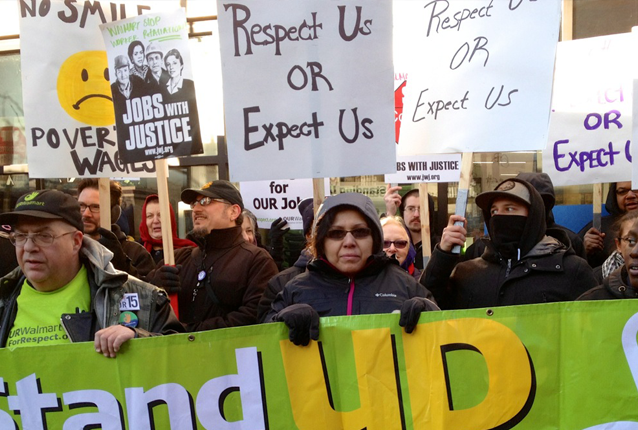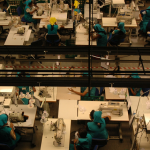Following two weeks of protests in cities across the country, leaders of the group OUR Walmart descended on Arkansas last Friday for the company’s annual shareholder meeting. In addition to reiterating their call for $15 an hour and access to full-time hours for all associates, worker shareholders proposed a handful of resolutions intended to make Walmart a more ethical employer and corporation. While employees presented these resolutions to the shareholder meeting, Jobs With Justice coalitions organized solidarity actions near stores around the country.
One of the OUR Walmart resolutions called for the adoption of a policy requiring future Chairs of the Walmart Board of Directors to be independent of the company. The employees argued that current Chair Rob Walton was unable to represent non-insider shareholders because of his membership in the Walton family, which controls more than half of outstanding company shares.
Venanzi Luna, a member of OUR Walmart who has worked for Walmart in Pico Rivera, Calif. for eight years, spoke out in favor of this resolution. Luna’s store was the first Walmart store to strike in 2012, and one of five stores the company abruptly closed in April, citing “plumbing issues.” More than 2,000 workers were laid off following these sudden closures. In explaining why an independent chair was needed, Luna said at the meeting:
“Mr. Rob Walton, the current non-independent chair of the board, is the most powerful person at our company. The buck stops with him… He could stop these layoffs. He could stop the retaliation. He could stop this company from repeatedly breaking the law. But he has not. “
Unsurprisingly, given that the Walton family controls a majority of the shares and thus a majority of the vote, the resolution did not pass. Walton also announced to shareholders that he would be keeping the business in the family, naming his son-in-law Greg Penner as his successor.
Another shareholder proposal, supported by the Sierra Club, asked that Walmart reduce greenhouse gas emissions produced by international marine shipping. In discussing the proposal, Sierra Club Executive Director Michael Brune explained, “Despite some efforts on the company’s part to reduce its carbon footprint, Walmart is still one of the largest and fastest-growing polluters in the country.” This measure similarly was not passed.
Other resolutions put forth by OUR Walmart workers included a request for annual reports on senior executive incentive compensation and a proposal for proxy access for shareholders.
While Walmart shareholders rejected the employees’ proposals, members of OUR Walmart are not resigned. “We’re not done yet,” said Mary Watkines, a 15-year Walmart associate, OUR Walmart member and shareholder. “We’re going to continue to speak up until all associates get what they need to support their families. That starts with getting Walmart to publicly commit to paying at least $15 an hour and a consistent full-time schedule for every associate who wants one.”
Indeed, OUR Walmart has successfully organized for improved working conditions this year. In February, Walmart caved to worker pressure and announced it would raise wages for 500,000 U.S. associates. Just this week, the company announced that it would raise wages for another 100,000 department managers and other specialized workers in U.S. stores.
These modest pay increases, without any guarantee of adequate hours, are by no means sufficient—many employees of the profitable corporation are still forced to rely on government assistance programs like food stamps to get by.
Clearly, Walmart and the Walton family—heirs to the Walmart empire—can afford to pay workers $15 an hour and provide full-time work, a move that would only increase the Walmart’s prices by mere pennies, according to an analysis by Slate and Marketplace last year. Since 2007, the fortune of six members of the Walton family has more than doubled to $148.8 billion. These six people have more wealth than 43 percent of America’s families combined.








